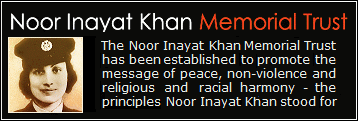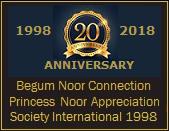

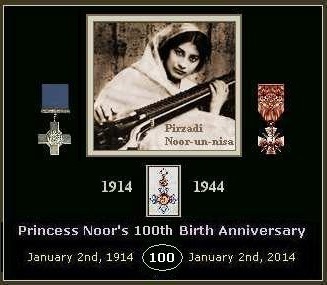
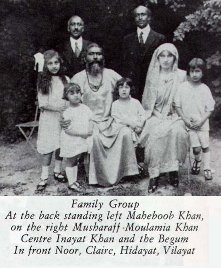 about Princess Noor on the Guestbook featured below Ora Ray Baker, the mother of Noor-un-nisa, was born in Albaquerque, New Mexico, on May 8th, 1890. She married Noor's father, professor Inayat Khan in 1913. The following brief article was written by her, admirably illustrating her convictions, concerning the seclusion of women in south asian culture: God is hidden in the vision, truth in the world unseen, the soul is hidden in the body, and love's tender feeling in the heart; so is woman, for all that is most precious is protected by nature from the sight of man. It sounds strange to us in the west when we hear of the Purdah women who still observe the Zenana customs in this civilized age. After giving the question further thought we find that seclusion originated amongst mystics, who not only close their lips from speech, but also seclude themselves in grass huts, forests and caves in the mountains. The Khalifs and leaders of ancient times veiled their faces in order to preserve their magnetism and a commanding personality. Even the present day royalties of both east and west, as well as the more important personages throughout the world, expose themselves much less than people in general. Another benefit of the Zenana is the consideration of motherhood and its responsibilities. The mother being the moulder of the child's character and form, it is most necessary for her to be away from the world, avoiding all undesirable impressions, worries and anxieties of life, in order for her thoughts to dwell upon naught else but love, harmony and beauty. She must also at all times avoid all excitements and irritabilities. This is really the most important reason for which seclusion was adopted. by: Jean Overton Fuller 37B New Cavendish Street, London W1M 8JR, United Kingdom. Telephone & Fax: 0171-722-0083  - Sufi Inayat Khan - by: Many years ago, Mrs H. van Tuyll van Serooskerken, an ardent Dutch lover of Indian classical music wrote to me from the Hague, requesting me to give her all the information I could gather about the great Sufi-mystic-musician-Pir Inayat Khan who had earned great popularity and fame in the West during his travels (from 1910 to 1926) in the U.S.A., U.K. and Europe. She wrote:- "I am a pupil of the late musician and philosopher Professor Inayat Khan of Baroda, the grandson and pupil of Professor Moula Baksh of Baroda . We people of the west are getting more and more interested in the grandeur and beauty of Indian music." It was while he was giving a Veena recital at the RAMAKRISHNA ASHRAM in San Francisco that he met, and fell in love with, Miss Ora Ray Baker - "a sensitive, fragile, feylike American girl" who was the *niece of Mrs. Mary Eddy Baker, the founder of the Christian Science Movement. They got married in Paris, and Inayat Khan rechristened her as "Sharada Ameena Begum". In one of the later photographs, Inayat Khan in a long loose robe, and with a flowing white beard, looks a bit like Poet Tagore. His wife, clad in a sari in the Parsi style looks serene, gentle, and charming. Her head is covered with the "Pallu" in true Indian style. Their elder son Vilayat Khan married an English lady, the second son Hidayat Khan married a Dutch lady, and Inayat Khan's brother and cousin also married Dutch girls, and all of them have become citizens of Holland. to be a distant cousin of Mary Baker Eddy  The greatest tragedy in the family was the brutal political assassination of Inayat Khan's beloved daughter Noor, a highly sensitive, talented, and clairvoyant girl, who had later become a secret agent working for the French Resistance Movement against the Nazis. She was captured by the Gestapo, tortured and brutally killed in the Dachau Concentration Camp on 13-9-1944. One of the witnesses of this sadistic torture- chamber wrote later:- "What happened was terrible. The girl was a bloody mass. The only word she uttered before they shot her through her head was- "Liberte"-". Thus tragically ended the young life of the vivacious Noor Inayat Khan (1914 to 1944) at the age of 29. In the words of Ravi bala Shenoy, "Noor was the only woman to win a posthumous George Cross and the CROIX de Guerre". Inayat Khan was lucky that he died many years before this terrible tragedy.  There was one other posthumous recipient of the George Cross and Croix de Guerre. Her name was Violette Szabo. More information may be obtained by following this link 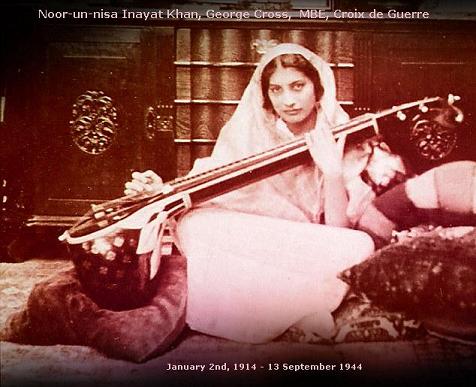 
 By THE ASSOCIATED PRESS Published: June 22, 2004 PARIS, June 21 - Pir Vilayat Inayat-Khan, who headed an international order of Sufis, members of a mystical offshoot of Islam, and wrote books about it, died on Thursday at his home in Suresnes, a suburb of Paris. He was 87. His death was announced by Donald Graham, an official of the Sufi Order International. A teacher and lecturer, Pir Vilayat was the son of Hazrat Inayat Khan, who helped bring Sufism to the West and created the Sufi order. He allowed followers to keep practicing their own religions as they explored Sufi mysticism, though traditional Sufism is a form of Islam. Pir Vilayat's books included "Toward the One" and "The Call of the Dervish." His works were translated into several languages. Born in 1916 in London to an Indian father and an American mother, Pir Vilayat studied cello and received a degree from the Sorbonne in Paris, Mr. Graham said. In World War II, he served in the British Royal Navy on a minesweeper. The boat was torpedoed during the D-Day invasion of Normandy, and Pir Vilayat was one of the few rescued, Mr. Graham said. Pir Vilayat's sister, Noor, worked with the French Resistance before she was captured and executed at the Dachau concentration camp. Pir Zia Inayat Khan, Pir Vilayat's eldest son, has been preparing to take over his father's position. He is also survived by his wife, Mary Walls; a daughter, Maria; another son, Mirza; and two grandchildren. |
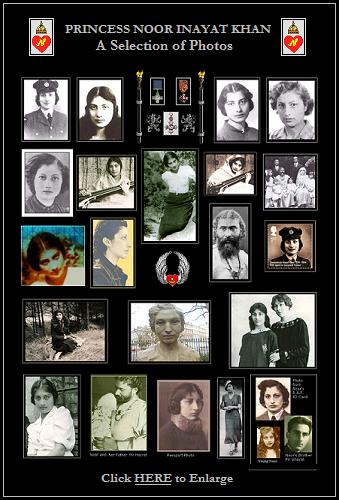

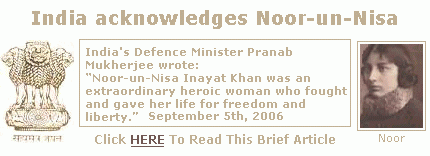









 Email: PNASI Web Administration internetaction@yahoo.com
Email: PNASI Web Administration internetaction@yahoo.com 
